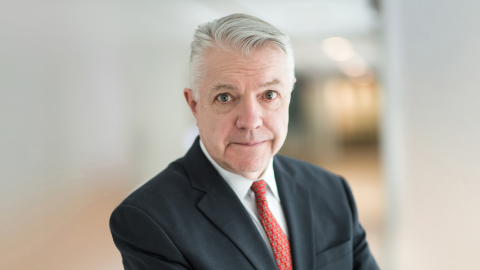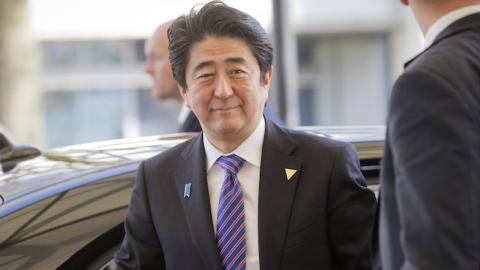On April 29 Shinzo Abe will make history as the first Japanese premier to speak to a joint session of Congress. In fact, Abe is making history in more ways than one. His appearance before Congress offers the perfect opportunity for the U.S. to strengthen its strategic ties to its longest-standing democratic ally in East Asia, and to show support for a friend in need.
During his three-year tenure in office, Abe has managed to shake Japan out of its decades-long pacifist stupor, and gotten it to wake up to the fact that it faces not one but three nuclear armed neighbors — China, North Korea and Russia. In particular, China's increasingly provocative moves against Japan's Senkaku Islands, which the Chinese claim belong to them, have generated a security threat on the threshold of the Japanese homeland, which could easily spark into full-scale conflict.
In response, since taking the premiership in 2012, Abe has overseen the creation of Japan's first National Security Council; a major revision of the country's National Defense Program Guidelines; and created its first National Security Strategy aimed at a "proactive contribution to peace." The latter has been made possible by Abe's insistence on revising the interpretation of Article 9 of the Japanese constitution, which forbade all military action except in defense of Japan's own borders. Abe has expanded the definition of self-defense to include participation in multinational operations outside the home islands, as well as "dynamic joint defense" with other countries including the United States in areas like the East China Sea.
All this would be meaningless without a significant rise in Japanese defense spending. Since taking office, Abe has overseen three straight years of defense budget increases. The 2015 budget for Japan's Self-Defense Forces will in fact be the biggest since World War II, more than $42 billion. That's a fraction of our Pentagon budget, but it undergirds a Japanese navy that now has more warships than France, more jet fighters than Britain's RAF, and a bigger army than Germany's — with new amphibious assets on the way and a Japanese submarine force slated to grow from sixteen to twenty two.
Still, in confronting China, it's a force that will require other strategic partners. The United States, with whom Japan has a mutual defense dating back to the 1950s, is the most important partner there is.
And so as Abe talks to Washington three years into office, Washington needs to think about Japan's needs from the United States as part of a "Pacific pivot."
Three items need to top the U.S.-Japan security agenda this year.
The first is full support for Japan in its dispute with China over the Senkaku Islands (which China calls Diaoyu). Here, the United States is taking a major step by reportedly agreeing to defend the Senkakus from attack, in the revisions of the U.S.-Japan security cooperation guidelines which will be unveiled during Abe's visit. This is an important and welcome step beyond previous commitments, but the United States could reinforce it by offering to provide American observers on Japanese patrol ships operating near the Senkakus, to witness and record typical Chinese provocative acts like activating weapons radar on Japanese vessels or buzzing them with fighter jets.
The second is fuller defense trade cooperation between the two countries. Abe has relaxed restrictions on Japanese arms exports, in place since the 1970s. A formal defense trade cooperation treaty would allow U.S. and Japanese defense companies to work together on new technologies like ballistic missile defense, unmanned systems, and hypersonic and high energy laser weapons — working to the advantage of both countries.
Third, instead of dwelling on Japan's military-imperialist past, as some critics of Abe's moves have done, it's important for the United States to look forward to the future. Abe's desire was to make his appearance here coincide with the seventieth anniversary of the end of World War II in Europe. Since then, Germany has become a pillar of economic growth and democracy in Europe, as well as a vital U.S. strategic partner.
The same has been true of Japan in the Pacific Rim since 1945. Now with the rise of China, it can also be the future fulcrum of security and stability in the region. All that's required is a strong show of support from the United States, and a warm welcome to the man who has made it possible.
















